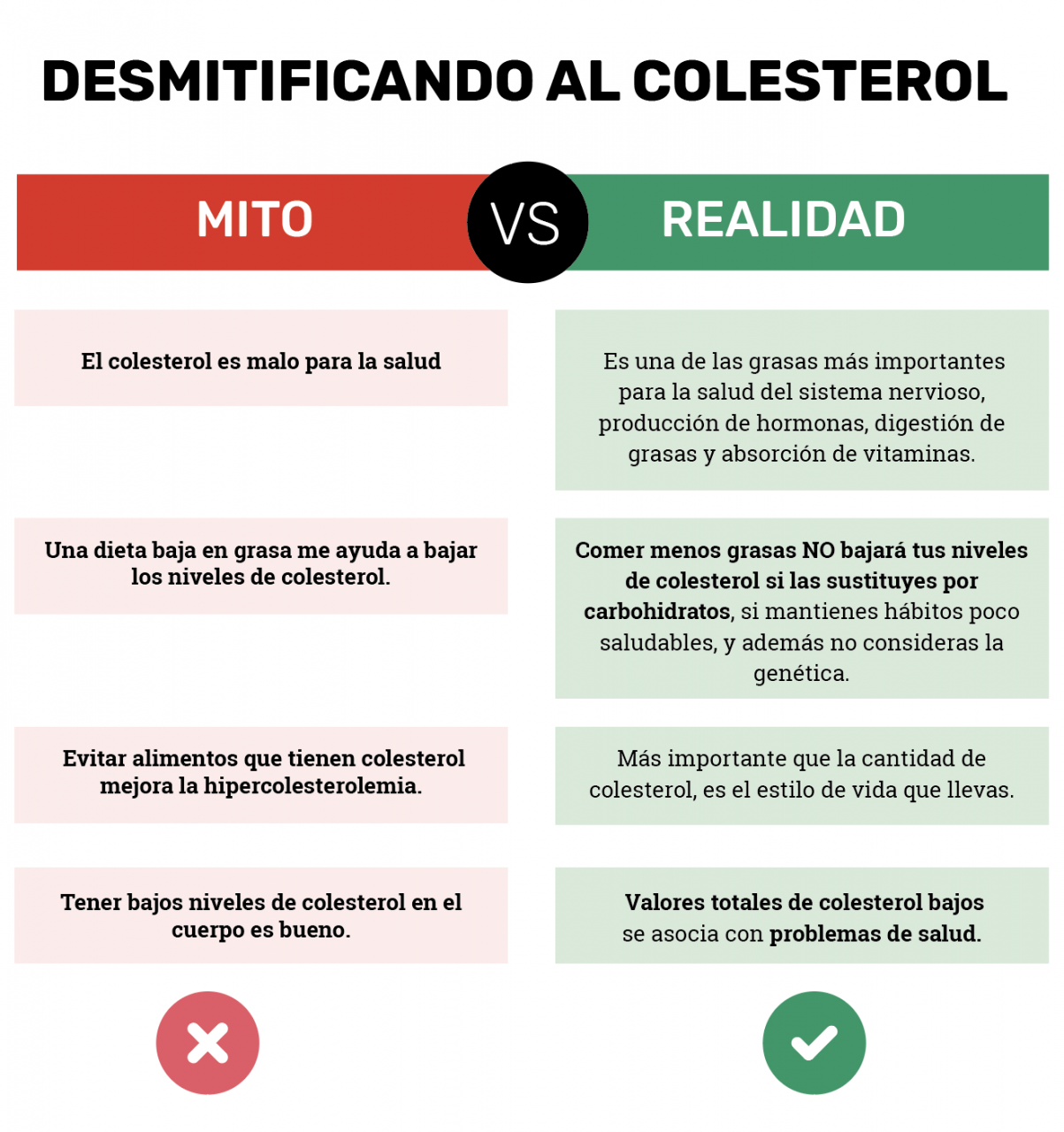The first thing to understand is that food is your ally, not your jailer . And while cholesterol has increasingly become a business for the medical and food industry, generating a wave of awareness about the importance of diet, it has also fostered many myths about “cholesterol-lowering diets.” that suggest unnecessary and ineffective restrictions. To help you with that, I am going to dismantle 4 most common lies about cholesterol that have not let you eat in peace.

1: cholesterol is bad for your health
Contrary to what is thought, cholesterol is one of the most important fats in our body , being essential for life when participating in functions that guarantee the normal functioning of the body.
Indispensable for the integrity of the nervous system and cell membrane.
Needed to produce steroid hormones in the body , such as cortisol, corticosteroids, and sex hormones such as estrogen and testosterone .
Participates in the formation of vitamin D.
It favors the digestion of fats and the absorption of fat-soluble vitamins such as A, D, E, and K, as they are the raw material of bile.
2. A low-fat diet reduces blood cholesterol
Although cholesterol is a type of fat, reduce fat intake in general in your diet does NOT guarantee the reduction of blood levels . Another restriction based on a myth that many submit, generating frustration when they do not achieve the desired results. This is because they do not consider other factors:
They replace the energy provided by fats with carbohydrates (many times ultra-processed), generating additional complications such as increased triglyceride levels in the blood and increased weight.
Unhealthy habits are maintained that promote the imbalance of blood cholesterol levels, such as sedentary lifestyle and smoking.
They ignore or do not consider the existence of familial hypercholesterolemia (where genes are the ones that determine the production of cholesterol in the body), undergoing unnecessary dietary restrictions.
Why is HDL / LDL balance important? It is said that HDL is “good cholesterol” and LDL is “bad cholesterol”, when both are necessary for normal functioning of the body. HDLs are those that carry excess cholesterol in the body to the liver for elimination. In contrast, LDL as LDL does the opposite, transporting cholesterol from the liver to the rest of the body to be used in the functions mentioned in point # 1 . L he complication comes when there is no balance between the two, generating accumulation of cholesterol in the blood.
3. Avoiding foods that have cholesterol lowers your blood levels
This statement is as nonsensical as saying: “If I eat lettuce, I’m going to lose weight.” If it were that simple, there would not be so many cases of high cholesterol in the world. Keep in mind that a good part of cholesterol is manufactured by our own liver, being more important the lifestyle we lead (physical activity, balanced diet, smoking…) , than the amount of cholesterol we take from the diet .
For example, fish contain cholesterol, but they also provide beneficial fats that help control blood levels and improve cardiovascular health. While there are products such as pastries that, although they do not have cholesterol, provide trans fats from margarine or processed palm oil that do alter blood cholesterol levels in the future.
And the so attacked egg? Although chicken eggs have a high cholesterol content, it is already more than proven that its effect on blood cholesterol is minimal, especially when compared to that of trans fats. In fact, many institutions have established that most healthy people can eat up to seven eggs a week without increasing the risk of heart disease.

4. Having low cholesterol levels in the body is good
All extremes are bad, and this case is no exception. Although having these elevated blood levels is associated with an increased risk of developing cardiovascular disease, having them below the recommended levels is not healthy either.
As we have explained in myth # 1, cholesterol is necessary for our body, determining several studies that if its total values, as well as the values of HDL and LDL, are below limits, it is associated with the development of health problems such as cancer, hemorrhagic stroke, depression, and anxiety.
As always, in health matters the conclusion ends up being the same: “shortcuts do not work”, in the end the most effective way to maintain your normal cholesterol levels is to work on your habits and start adopting a healthy lifestyle based on:
- Natural food with a good supply of fiber, based on the consumption of vegetables, fruits, and seeds.
- Increase the consumption of fish.
- Favor the intake of polyunsaturated fats such as olive oil, avocado, and nuts.
- Be physically active.
- Eliminate smoking.
Isn’t it curious that the final recommendations are always the same? Let’s stop believing once and for all in shortcuts, and in miracle diets and products; Let’s start to adopt healthy habits, to listen to our body, and to give it foods that feel good to be able to live well, longer and better.
If you found this article interesting, don’t miss other similar ones:
- Foods high in healthy cholesterol
- Cholesterol is not bad, it is necessary
- Why does a healthy diet say YES to bacon?
- Myths about fat debunked
